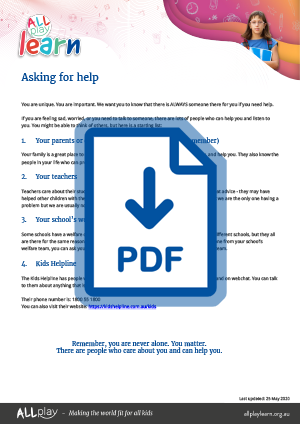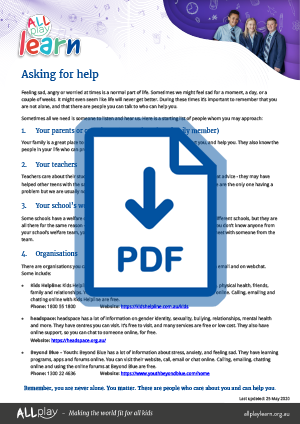
Child Wellbeing
On this page:
- What are some key supports for child/teen mental health and wellbeing?
- How can I talk to children/students about their worries?
- What supports can I access if I am concerned about a child’s/student’s mental health and wellbeing?
We all worry or feel scared at times, but some children may feel particularly unsettled with sudden changes in routine. Below are some resources that can help educators and teachers deal with the heightened emotions that children may be feeling.

What are some key supports for child/teen mental health and wellbeing?

How can I talk to children/students about their worries?
Some children may have worries or questions about COVID-19, including worrying that they may have the virus if they are feeling unwell. Some children may also feel unsettled by changes in their environment, such as educators/teachers wearing masks, or the impact of social distancing. Here you will find some tips for talking with children about their questions or worries on COVID-19.
- Talking about COVID-19 worries: In early childhood, primary school and secondary school
- Helping a child communicate when feeling unwell
- Talking with children about other changes
- Recognising and supporting child anxiety with our anxiety resource toolkit

What supports can I access if I am concerned about a child’s/student’s mental health and wellbeing?
It is important that you are familiar with the wellbeing policies within your early childhood education and care setting or school. These will help you create and maintain environments that are safe and supportive for the care, safety and welfare of children/students. Early identification of mental illness is particularly important after periods of significant stress. Keep an eye out for indicators that a child may be experiencing mental illness (including early or warning signs), and help them to access appropriate supports.
AllPlay Learn has created two handouts that teachers may provide to students in primary and secondary schools. These handouts describe ways that students can ask for help if they are worried, stressed, or need to talk to someone.
For more information on supporting mental health, you may visit these websites:
- Department of Education and Training Victoria Promoting mental health and wellbeing in your school
- Department of Education and Training Victoria Suicide prevention and response within schools
- Managing wellbeing for educators by BeyondBlue
- Smiling Mind's Digital Care Packs to support kids through COVID-19 and beyond


